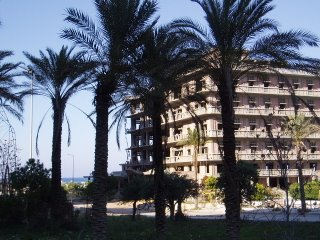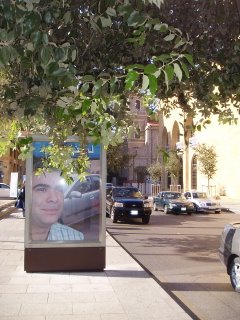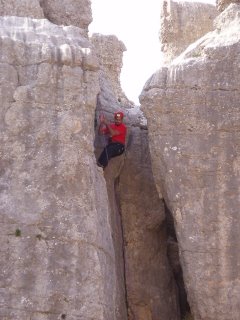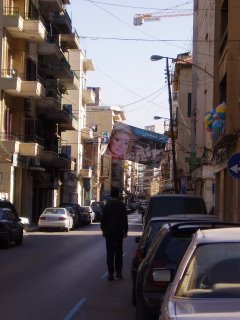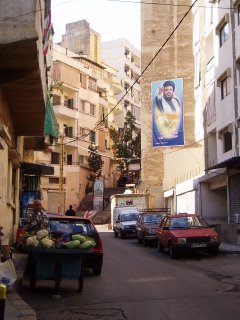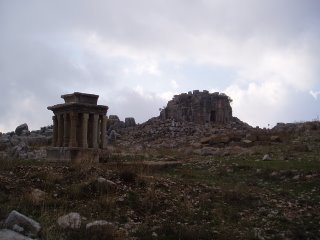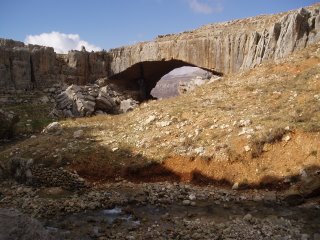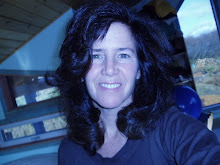
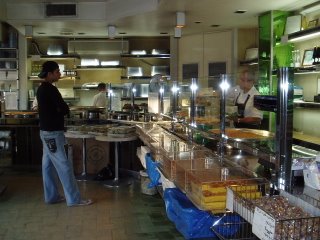
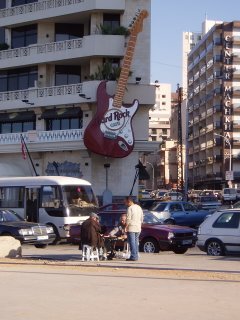
Dawn rises quietly today over Beirut (first photo), as seen from the balcony of Wael & Zena's lovely home in Achrafieh. Well, the post-partum depression phase is not quite here yet, but I've fewer than 3 hours before lift-off from Beirut, to London, then on to Anchorage via Boston & Salt Lake City. The past few days have been a blur, and despite nearly a week of sleep deprivation, sleep would not come to me. The 5 AM call of the muezzin, hypnotic and calming, was a welcome interruption from the incessant buzz of a particularly tenacious mosquito. Boxes and bags packed, goodbyes spoken. And, despite my own disappointment with how much I was able to complete on the OSCP, Wael seems quite satisfied and eager to move forward toward its completion. At this point, there is little to be done about the oil that has weathered to a tarry crust on parts of the nation's rocky shore. The fisherman's port of Delieh continues to act as a sump for a mysterious source of thick oily mousse that laps back and forth on the miniscule tide of this tiny bay.
The Lebanese pastry shops (second photo) are works of art, sparkling clean arrays of tiny nut and honey bites of heaven arranged on shining silver serving plates. The Greek baklava can't compare to the absurdly decadent "beklawa," the Lebanese pride. The baker asked me what brought me to Beirut, and we got to talking about the oil spill, what the long-term effects might be, and what might still be done. With so many other issues on Lebanon's collective mind, the oil spill is far removed from the daily events that teeter toward full governmental collapse. "Every day, I drive by Delieh, and still there is oil, like a bowl collecting if from where, in the sea? I don't know," the baker tells me. I am glad someone has noticed, because the fisherman in the port seem to have come to accept its murky presence and its filth on their hulls, its scent in their nostrils. "Can we really do anything about this now?" he asks. Of course, I reply - we learn from it and plan for the future. Even if warfare once again splits a coastal energy plant's' fuel supply and spits it into the sea, we can try to push it where we want it to go, we can use tools to protect certain areas, we can act faster to reduce its damage. He nods and seems comfortable with this idea. Yes, for later....and it feels good talking to someone outside, who can think about the future. Although, I don't utter my greatest hope - that we can resolve the religious hatred of this war-plagued area and achieve a common goal that ends the useless destruction.
Walking the Corniche in yesterday's unflagging heat, collecting pieces and flavors of Lebanon to bring back home to family and friends, I taste the salty breeze of the Mediterranean, basking in the brief cool breeze that blows the city's stale air high above the city. As every day, men and boys fish along the sea wall, others dive from the nearby rocks and splash about in the flat sea. I watch a passionate game of "combat backgammon" ensue, with the Hard Rock Cafe and other western touches oddly out of place in the background (3rd photo). The long walk home, laden with packages, will be my last through these streets for quite sometime, but I still prefer it to taking a taxi.
